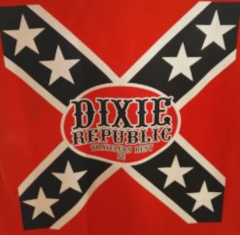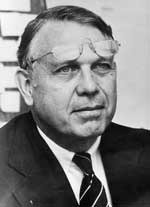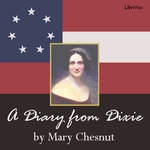A Diary From Dixie, Chapter 12
Page 210
XII. FLAT ROCK, N. C.
August 1,1862 - August 8,1862
FLAT ROCK, N. C., August 1,1862. - Being ill I left Mrs. McMahan's for Flat Rock.1 It was very hot and disagreeable for an invalid in a boarding-house in that climate. The La Bordes and the McCord girls came part of the way with me.
The cars were crowded and a lame soldier had to stand, leaning on his crutches in the thoroughfare that runs between the seats. One of us gave him our seat. You may depend upon it there was no trouble in finding a seat for our party after that. Dr. La Borde quoted a classic anecdote. In some Greek assembly an old man was left standing. A Spartan gave him his seat. The Athenians cheered madly, though they had kept their seats. The comment was, "Lacedemonians practice virtue; Athenians know how to admire it."
Nathan Davis happened accidentally to be at the station at Greenville. He took immediate charge of Molly and myself, for my party had dwindled to us two. He went with us to the hotel, sent for the landlord, told him who I was, secured good rooms for us and saw that we were made
1. Flat Rock was the summer resort of many cultured families from the low countries of the South before the war. Many attractive houses had been built there. It lies in the region which has since become famous as the Asheville region, and in which stands Biltmore.
Page 211
comfortable in every way. At dinner I entered that immense dining-room alone, but I saw friends and acquaintances on every side. My first exploit was to repeat to Mrs. Ives Mrs. Pickens's blunder in taking a suspicious attitude toward men born at the North, and calling upon General Cooper to agree with her. Martha Levy explained the grave faces of my auditors by saying that Colonel Ives was a New Yorker. My distress was dire.
Louisa Hamilton was there. She told me that Captain George Cuthbert, with his arm in a sling from a wound by no means healed, was going to risk the shaking of a stagecoach; he was on his way to his cousin, William Cuthbert's, at Flat Rock. Now George Cuthbert is a type of the finest kind of Southern soldier. We can not make them any better than he is. Before the war I knew him; he traveled in Europe with my sister, Kate, and Mary Withers. At once I offered him a seat in the comfortable hack Nathan Davis had engaged for me.
Molly sat opposite to me, and often when I was tired held my feet in her lap. Captain Cuthbert's man sat with the driver. We had ample room. We were a dilapidated company. I was so ill I could barely sit up, and Captain Cuthbert could not use his right hand or arm at all. I had to draw his match, light his cigar, etc. He was very quiet, grateful, gentle, and, I was going to say, docile. He is a fiery soldier, one of those whose whole face becomes transfigured in battle, so one of his men told me, describing his way with his company. He does not blow his own trumpet, but I made him tell me the story of his duel with the Mercury's reporter. He seemed awfully ashamed of wasting time in such a scrape.
That night we stopped at a country house half-way toward our journey's end. There we met Mr. Charles Lowndes. Rawlins Lowndes, his son, is with Wade Hampton.
First we drove, by mistake, into Judge King's yard, our
Page 212
hackman mistaking the place for the hotel. Then we made Farmer's Hotel (as the seafaring men say).
Burnet Rhett, with his steed, was at the door; horse and man were caparisoned with as much red and gold artillery uniform as they could bear. He held his horse. The stirrups were Mexican, I believe; they looked like little sidesaddles. Seeing his friend and crony, George Cuthbert, alight and leave a veiled lady in the carriage, this handsome and undismayed young artillerist walked round and round the carriage, talked with the driver, looked in at the doors, and at the front. Suddenly I bethought me to raise my veil and satisfy his curiosity. Our eyes met, and I smiled. It was impossible to resist the comic disappointment on his face when a woman old enough to be George Cuthbert's mother, with the ravages of a year of gastric fever, almost fainting with fatigue, greeted his vision. He instantly mounted his gallant steed and pranced away to his fiancée. He is to marry the greatest heiress in the State, Miss Aiken. Then Captain Cuthbert told me his name.
At Kate's, I found Sally Rutledge, and then for weeks life was a blank; I remember nothing. The illness which had been creeping on for so long a time took me by the throat. At Greenville I had met many friends. I witnessed the wooing of Barny Heyward, once the husband of the lovely Lucy Izard, now a widower and a bon parti. He was there nursing Joe, his brother. So was the beautiful Henrietta Magruder Heyward, now a widow, for poor Joe died. There is something magnetic in Tatty Clinch's large and lustrous black eyes. No man has ever resisted their influence. She says her virgin heart has never beat one throb the faster for any mortal here below - until now, when it surrenders to Barny. Well, as I said, Joseph Heyward died, and rapidly did the bereaved beauty shake the dust of this poor Confederacy from her feet and plume her wings for flight across the water.
Page 213
[Let me insert here now, much later, all I know of that brave spirit, George Cuthbert. While I was living in the winter of 1863 at the corner of Clay and Twelfth Streets in Richmond, he came to see me. Never did man enjoy life more. The Preston girls were staying at my house then, and it was very gay for the young soldiers who ran down from the army for a day or so. We had heard of him, as usual, gallantly facing odds at Sharpsburg.1 And he asked if he should chance to be wounded would I have him brought to Clay Street.
He was shot at Chancellorsville,2 leading his men. The surgeon did not think him mortally wounded. He sent me a message that "he was coming at once to our house." He knew he would soon get well there. Also that "I need not be alarmed; those Yankees could not kill me." He asked one of his friends to write a letter to his mother. Afterward he said he had another letter to write, but that he wished to sleep first, he felt so exhausted. At his request they then turned his face away from the light and left him. When they came again to look at him, they found him dead. He had been dead for a long time. It was bitter cold; wounded men lost much blood and were weakened in that way; they lacked warm blankets and all comforts. Many died who might have been saved by one good hot drink or a few mouthfuls of nourishing food.
One of the generals said to me: "Fire and reckless courage like Captain Cuthbert's are contagious; such men in an
1. The battle of Sharpsburg, or Antietam, one of the bloodiest of the war, was fought in western Maryland, a few miles north of Harper's Ferry, on September 16 and 17, 1862, the Federals being under McClellan, and the Confederates under Lee.
2. The battle of Chancellorsville, where the losses on each side were more than ten thousand men, was fought about fifty miles northwest of Richmond on May 2, 3, and 4, 1863. The Confederates were under Lee and the Federals under Hooker. In this battle Stonewall Jackson was killed.
Page 214
army are invaluable; losses like this weakened us, indeed." But I must not linger longer around the memory of the bravest of the brave - a true exemplar of our old régime, gallant, gay, unfortunate. - M. B. C.]
. . . . . . . . . . . . . . . . . . . . . . . . . . . . . . . . . . . . . . .
August 8th. - Mr. Daniel Blake drove down to my sister's in his heavy, substantial English phaeton, with stout and strong horses to match. I went back with him and spent two delightful days at his hospitable mansion. I met there, as a sort of chaplain, the Rev. Mr. - . He dealt unfairly by me. We had a long argument, and when we knelt down for evening prayers, he introduced an extemporaneous prayer and prayed for me most palpably. There was I down on my knees, red-hot with rage and fury. David W. said it was a clear case of hitting a fellow when he was down. Afterward the fun of it all struck me, and I found it difficult to keep from shaking with laughter. It was not an edifying religious exercise, to say the least, as far as I was concerned.
Before Chancellorsville, was fatal Sharpsburg.1 My friend, Colonel Means, killed on the battle-field; his only son, Stark, wounded and a prisoner. His wife had not recovered from the death of her other child, Emma, who had died of consumption early in the war. She was lying on a bed when they told her of her husband's death, and then they tried to keep Stark's condition from her. They think now that she misunderstood and believed him dead, too. She threw something over her face. She did not utter one word. She remained quiet so long, some one removed the light shawl which she had thrown over her head and found
1. During the summer of 1862, after the battle of Malvern Hill and before Sharpsburg, or Antietam, the following important battles had taken place: Harrison's Landing, July 3d and 4th; Harrison's Landing again, July 31st; Cedar Mountain, August 9th; Bull Run (second battle), August 29th and 30th, and South Mountain, September 14th.
Page 215
she was dead. Miss Mary Stark, her sister, said afterward, "No wonder! How was she to face life without her husband and children? That was all she had ever lived for." These are sad, unfortunate memories. Let us run away from them.
What has not my husband been doing this year, 1862, when all our South Carolina troops are in Virginia? Here we were without soldiers or arms. He raised an army, so to speak, and imported arms, through the Trenholm firm. He had arms to sell to the Confederacy. He laid the foundation of a niter-bed; and the Confederacy sent to Columbia to learn of Professor Le Conte how to begin theirs. He bought up all the old arms and had them altered and repaired. He built ships. He imported clothes and shoes for our soldiers, for which things they had long stood sorely in need. He imported cotton cards and set all idle hands carding and weaving. All the world was set to spinning cotton. He tried to stop the sale of whisky, and alas, he called for reserves - that is, men over age, and he committed the unforgivable offense of sending the sacred negro property to work on fortifications away from their owners' plantations.











